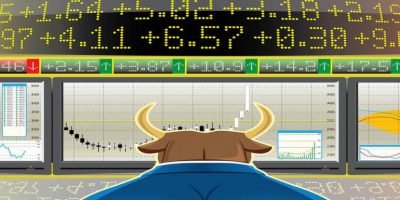
Stock Market Investment: How trying to time the markets is disastrous for investors
Attempts at timing the stock markets are not just a waste of effort, but are also likely to have very disastrous consequences in the long run.
 While in the long run, stock markets are slaves of earnings, in the short run they move randomly based on sentiments and liquidity.
While in the long run, stock markets are slaves of earnings, in the short run they move randomly based on sentiments and liquidity.“Is it a good time to invest?” Clearly this is the prominent question in the minds of most prospective investors. Given the transparency and high visibility of capital markets with dedicated television channels and newspapers, it is not surprising that ‘timing of the market’ occupies such an important space in the mind of investors.
This effort and focus on timing is not just futile as no one has been able to master the market movements with any degree of accuracy, but is also a big hindrance in the way of generating smart returns on your equity portfolios. While in the long run, markets are slaves of earnings, in the short run they move randomly based on sentiments and liquidity. Problem is sentiments are extremely fickle and impossible to predict. Moreover by focusing on the timing, investors are very likely to miss the wood for the trees. Historical data suggests that big profits are always made by staying invested in the markets for a long period of time and ignoring the short-term fluctuations. Weakness in markets can always be used to add to your investments and in the same way buoyancy can be a great time to book some profits. However, trying to time the markets will most likely lead investors to completely miss out on the long-term capital creation opportunity. The loud and 24X7 media is unfortunately leading many prospective investors to commit that mistake.
As an example, consider the scenario after the Lehman Brothers Collapse in 2008. Markets were in a complete bear grip with fear and panic gripping investors worldwide. This was a great investing opportunity. While in hindsight this appears to be a given, the reality is very few investors actually put money to work in 2008 and early 2009. Reason is that experts, analysts and wise men were everywhere warning investors not to commit money at this juncture. Nifty was trading in the range of 8,000 to 10,000 for nearly 6 months, but nearly every market participant was talking about and waiting for a level of 5,000 on Nifty. In their effort to time the markets they lost out on what was a golden opportunity to multiply their wealth. Had they instead simply used the weakness to add to their portfolio rather than focus on getting the timing correct, they would have gained immensely over the next few years.
Let us look at this issue over a longer period of time. Morgan Stanley produced a research paper in 2017 analyzing the returns in Indian stock markets over the past two decades. The key highlights are presented in the two slides given below:


One can clearly draw two conclusions from the above data. One is that historically returns from stock markets are clearly amazing over long periods of time, especially in emerging markets like India. Secondly, anyone trying to time the markets will nearly always end up loosing a very large part of these returns. Consider the probability of catching these super 100 days, keeping in mind that a majority of them came with no forewarning.
To understand how difficult is to catch these buoyant days, consider what happened on 18th of May, 2009. This was a Monday and the general election results were announced on the preceding weekend. Markets were still in a bearish grip though the indices had run up significantly in the past few weeks. The general consensus amongst all pollsters and media was that it would be a coalition government. Though the markets were still trading at very attractive valuations, yet the scare and negativity surrounding the bear market was simply impossible to ignore. The general advise of all experts to investors was to use the pull back rally happening in April and May to lighten positions and increase cash allocation in portfolios.
The election results surprised everyone on the positive side. A stable government was to be formed and this was something not factored in at all by the markets. The indices moved up by a whooping 20% within a few minutes from the opening bell on the 18th of May. What can be considered a very smart annual return, had happened on a single day. It was truly a dream day for bulls. However, the pity was that majority of investors missed this super bonanza because they were either waiting for lower levels to start buying or had reduced their exposure fearing another reversal after election results. Clearly the market set up and the surrounding noise did not favour investors catching this outstanding day. Therefore, no surprise that this day ended in more remorse and regret rather than cheer and celebration. Likewise majority of the other exuberant days also surprised everyone and were nearly impossible to catch.
Now one can argue that the above research and anecdotes are India-centric. Hence it is important to look at similar case studies in developed markets. The chart below is a compilation of twenty one years of investment data on the S&P 500, a very widely used index to track the US markets.

Examination of this data should leave us with no doubt about the grave danger of trying to time the markets anywhere. A miss of meagre 30 best days would have resulted in your portfolio generating negative returns over such a long period of time. Given the fickle nature of the markets, missing these 30 days, representing just about half a percentage of the total trading days in this period, is not just possible but would have actually happened with a very large number of investors.
To conclude, one can safely say that attempts at timing the stock markets are not just a waste of effort, but are also likely to have very disastrous consequences in the long run. Investors are, uniformly across geographies, better off making an effort to just stay invested in the markets for the long haul and simply ignore the noise surrounding it. The only way to achieve this is by sticking to two simple rules. Firstly, investing whenever you have a surplus and resisting the temptation to wait for some better time to arrive. Secondly, investing only that much which you can safely keep aside with no time constraint.
[“source=gsmarena”]


